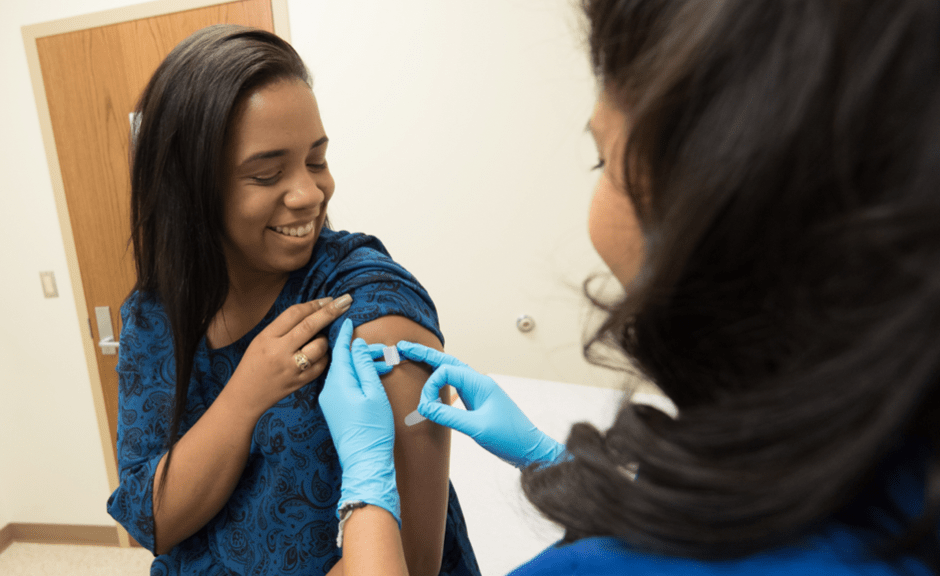
Working Together Toward COVID-19 Vaccination Goals
I know we’ve been saying this for quite some time now, but this past week’s been quite the week. Thursday March 11 was the anniversary of the COVID-19 pandemic, and a year later we’re in the throes of the both frustrating and optimistic process of COVID-19 vaccination. Others have written helpfully on many aspects of this situation; in this piece I hope to talk about how all the competing types of rhetoric at play, especially scarcity rhetoric, affects the human response, especially in the current US religio-political climate. In the process I hope to help us to understand and overcome some of our unnecessary mental blockages to help ourselves and others as we work together to reach toward getting as many people as possible vaccinated against COVID-19.
Coming on the heels of a global trauma in the shape of a pandemic, there’s a lot going on here to unwrap. I’ll do my best.
My Background and Focus Here
As a reminder, I’m coming into this as a pastor’s kid with a PhD in communication who researches and teaches about stress, trauma, and conflict communication.
Others, like this recent New Yorker piece, are fabulous at explaining why the supply chain for this vaccine is so complicated, which is currently what creates the scarcity in the first place.
(I say currently, because of course many other hindrances were going on up to a couple of months ago, when the previous presidential administration was not only without a pandemic plan, but was hindering their own staff trying to help. I wrote about this way back last March already, and it got worse before it finally got better on January 20, which was why I recently wrote a piece about grieving our losses from the past year and beyond.)
That New Yorker piece on supply chain issues is wonderfully done, and supplements what I’m trying to do here, which is to discuss how the competing rhetorical messages around scarcity are affecting views of morality and conflict in the current situation. If that sounds clear as mud, I’ll ask for your patience as I dive in.
A Quick Disclaimer
DISCLAIMER: I’m in the US, and as such, I’m addressing the complex problems here in this piece. Ultimately I think and hope we’ll be able to vaccinate as many people as possible around the world, and I understand how complex that broader question is, and don’t think we Americans are any better than any of the rest of the world. While my discussion is somewhat unique to the challenges faced in our country and the solutions people are reaching toward based on American constraints, I hope that those of you outside the US, or with spheres of influence that reach outside the US, will be able to transfer some of the advice toward advocating for greater COVID-19 vaccination wherever you are able to.
Our Complex Rhetorical Ecosystem around COVID-19 Vaccination
Okay, so as I see it, we have multiple things going on in the current rhetorical climate/complex ecosystem in the US around COVID-19 vaccination:
- Actual production, resource, and distribution gaps in creating and distributing an entirely new vaccine, some of which can be fixed and some of which can’t;
- An extremely localized response to deciding who is eligible when and who gets to be prioritized in various locations;
- An extremely arcane and complex system of COVID-19 vaccination signup in various locations;
- Federal rhetoric and measures blessedly designed to smooth some of the above things out through creating a national response, removing some of the scarcity (thank goodness everyone worked so hard for that fair election!);
- New CDC guidelines which both helpfully and not create new guidelines for fully vaccinated people (lots of feels to work through there, especially with people who haven’t been responsible the whole time);
- Many helpful local, state and grassroots efforts working to solve some of the above problems;
- And, last but definitely not least, harmful results from the previous unhealthy government and current unhealthy local governments that are making everything worse in some areas and with some people.
The Potential Moral Dilemmas Resulting from This Mess
The results of all these current factors boils down to at least the following sets of moral dilemmas:
- The moralities and best practices around who gets to go when in line and “who deserves a vaccine”
- The moralities and best practices around continuing—and shifting—pandemic precautions in and around and after COVID-19 vaccination
- The continuing moral problem of both “wait and see” folks and more ardent anti-vaxxers
Okay, So I Just Called These Moral Dilemmas—But Maybe We Shouldn’t Call Them All That?
As I dive more deeply into these questions, now’s the great time for a quick note (or, if you will, a reminder, seeing as how I wrote about this earlier in pandemic) that I think calling the first two things “moral dilemmas”—ESPECIALLY the first one—is a thing we should shy away from.
Why might that be so? Well, let’s be clear. We have a lot of data at this point about who the virus has been hitting hardest, and some things are clear about who that is—but the question of vaccine distribution is a super complicated one for good reason.
One reason that is the case that the virus has still been super unpredictable. The other is that group 3 listed above combines with people not following best practices in terms of the precautions–in other words, #2 above.
And let’s be clear: beyond those who are blatantly hurting others through their pandemic minimization/anti-masker tendencies, most of us are genuinely doing our best here, and all are dependent on enough people getting vaccinated AND being precautious enough going forward for things to truly improve enough.
What to Do About Denialists and Those Who Don’t Care
This has created a challenging situation in which some people want to get the vaccine when they are eligible but are worried about potentially taking it from some more vulnerable party. Often these are the same people that have been taking a ton of precautions for the last year.
In some locations, this has unhelpfully led to too many open appointments, while in others there are too many people looking for appointments, all thanks to complex distribution systems.
What this means is that in addition to trying to get rid of the virus, we also have the tensions and anxieties around social loafing—or the feeling that many people have not been doing their part thus far—involved in the best practices and perceived moralities around #1 on the moralities list I just made.
In short, you have people who are genuinely trying so hard to do the right thing that they’re scared to get the vaccine for themselves, and those are often the same people convincing themselves they don’t deserve the vaccine. This is, well, counterproductive if we all want to get to maximal COVID-19 vaccination as quickly as possible. Let me explain why.
The Various Ways to Slice the Pie
So yes, there’s a lot of ways to slice the who gets to go first pie.
I mean, on one hand there’s the desire to distribute the vaccine to the most vulnerable people—people who would be more likely to die from the disease. We have data that gestures at this, on one hand, but it’s mostly correlations, not causation. There are no guarantees. Healthy people without preexisting conditions have been dying too.
There’s also a desire to distribute the vaccine first to the people who are likely to be exposed the most because of their jobs, etc. That seems important. But calculating out exact viral load likely is, well, inexact, and will always catch some populations with less intense situations than others, leading to jealousy, etc.
Then again, there’s also merit to distributing to those who are not currently exposed much, but are likely to help others in the previous two categories to get vaccinated, or to influence those in category 3 to get vaccinated, or to lighten the loads of those exhausted from bearing too much burden.
Which leads to the approach just in general to get shots in arms so as to not waste doses and move toward immunity faster.
There are good arguments in all of these directions, and each locality and distribution site has a slightly different perspective on how they’re slicing the pie.
This week President Biden announced that he would like every location to make every adult eligible for COVID-19 vaccination by May 1. This seems to be moving us toward the “shots in arms” approach.
The Intersectionality and Instability of It All Can Be Super Triggering
I can see why President Biden is trying to shift us in this direction. After all, the above list means this is a highly intersectional issue that is impossible to get just right.
As I discussed in the article around True Civility, there’s no way to perfectly get this right in a complex system. And I can guarantee you that no place is getting it perfectly right.
And so I’m incredibly glad that President Biden is moving us toward more of a shots in arms approach for COVID-19 vaccinations together with moves toward ramping up production and distribution. I don’t think it will fix everything, but having a helpful non-denialist leadership approach paired with instrumental support to make things genuinely go faster helps tremendously–especially to cut through the problem of judging who ought to be eligible.
Why We Need to Be Careful about Being Judgmental about Those Getting Vaccinated
Here’s the thing: as I’ve said, we have some data, but not all, to wholly predict who is more vulnerable. And if we believe that every life is truly sacred, we need to give ourselves space to grieve the scarcity, but it’s honestly not helpful for us to be jerks about who’s gotten the vaccine and who hasn’t.
And, especially as a lot of states are entering vaccination phases away from particular jobs and ages and more based on culturally-sensitive-to-discuss medical conditions, we need to take care that we don’t add to the stress and trauma of invisibly vulnerable populations through requiring them to generally discuss why they were able to be vaccinated. This article at Vice helps explain why.
This presidential direction toward flat-out shots in arms helps limit that kind of uncomfortable added stressor for many folks.
Overcoming a Zero-Sum View, Especially Internally
In general, if we want to pull ourselves out of the dangers of the Trauma Olympics (unintentionally shaming ourselves or other populations in the process) and trying to overly moralize who gets to have a shot, the best practices I would recommend are to refuse to see it as a zero-sum game.
As I’ve said many times before, looking at the world from a zero-sum view sees all conflicts as having discrete winners and discrete losers, as though the world were made up of only so many pieces of pie.
The truth of the COVID-19 crisis is that even in the midst of vaccine scarcity, there is no clear easy way to distinguish the perfectly greatest good. As with many other parts of this global mess, there are genuinely a lot of exhausting losses to be grieved in this part of the overall messy situation too.
Not Feeling Shame If You Get a Shot
And yet, there ARE many clear things we can do to help ourselves and others. One really crucial one is making sure we don’t have shame for thinking that if we win a vaccine slot when we’re eligible, that means that others automatically have to lose.
See, that simply does not have to be true. The truth is, that for every new shot in the arm of someone willing to get a shot, especially one who is willing to help others, we are closer to the final goal of decreasing possible deaths from the disease.
And the truth is that if you get vaccinated and are able to get to full efficacy, you not only most likely are helped yourself, but you also have greater flexibility to help others with that freedom.
The Freedom to Help Others as Well as Yourself
See, with all of this unhealthy rhetoric defending a particularly selfish view of “freedom” to not be vaccinated or wear a mask or socially distance, it’s easy to let it overly influence us into thinking that the opposite actions are also really selfish.
But the truth is that freedom can entail the freedom to do good for ourselves and others. Getting a vaccine does protect ourselves, but it also does protect others as well. It is too easy to get trapped into this view that it’s somehow shameful to get vaccinated because it helps ourselves, but the ecosystem of the world, especially not in mutually beneficial public health actions, is rarely that cut and dried.
It’s simply doesn’t have to be a simple win-loss scenario. It is often at least somewhat win-win, and many times very win-win—and that’s because it’s an effort where the more people get vaccinated, the closer we are to protecting our communities as well as others around us.
How We Can Help
In truth, just getting vaccinated helps build us toward that whole containing and wiping out the disease goal. But it doesn’t have to stop there—and if you are one of those who feel guilty about getting vaccinated, well, here are some ideas of other things we can be doing alongside getting vaccinated as we’re eligible:
- We can (and should) continue to take appropriate precautions, try to screen others for the same, and set boundaries about seeing others who aren’t following needed precautions;
- We can rest as we need to, look for the helpers to overcome our own pandemic fatigue, grieve what we need to, and give and receive social support so we can help each other move forward with whatever energy we might be able to find.
- We can get vaccinated as we become eligible and seek support where we need to in order to do the best we can to promote eligible people to get the shot. Various “vaccine hunter and angels” groups on FB have sprung up to help in this effort—accessing them, and helping others to as well, can be mutually beneficial.
- We can help other people navigate the arcane system to find and be transported to appointments, as it is safe for us to do so.
- We can educate ourselves about the complexities of the system, and advocate for healthier policies in places and with politicians and others who are being jerks about promoting vaccination efforts, including calling our local representatives and engaging in political actions.
- Last but not least, we can generally use our sphere of influence, whatever that may be, to promote vaccination as well as helping others to get vaccinated however we are able. That may include persuading “wait and see” populations around us. This article has some great advice about some techniques to persuade this blessedly shrinking population.
Focus on the Final Goal
Overall, let’s focus on the overall goal of shots in arms, friends, and recognize that we don’t have to be competing if we’re all working on a slightly different piece of the blocks to get there.
And let’s remember that getting a COVID-19 vaccination—if we are also trying to help others—does NOT have to mean that someone else loses. Getting a COVID-19 vaccination as you’re eligible, even if you’re too tired from pandemic fatigue to do anything else on the above list for the time being, is itself a great good. It helps you AND it helps others.
And when you’ve rested a bit, surely there’s SOMETHING else on the list—or something else you can think of—you can do to help others as well. In fact, if each of us translates our empathy for a particular part of the overall problem into as much action as we can, we’ll all reach our overall goal faster.
As usual, there’s more that I could say on this, but hopefully this is a start.
A Final Charge
Go team #AssertiveSpirituality! Let’s continue to do what we can where we are with what we’ve got to keep speaking up against the toxic crap in ourselves and others and keep working to build a literally healthier world for us all. Let’s fight back against scarcity mentalities to keep doing what we can to do this thing.
Looking for more resources toward speaking up for what’s right and dealing with the conflict that results?
Boy, do we have got a free “Assertive Spirituality Guide to Online Trolls” for you. It actually helps you with conflict both online and off. To get it, sign up for our email newsletter (either in the top bar or by checking the appropriate box when commenting on this article). Once you’ve confirmed your email address, we’ll send you the link to the guide in your final welcome email. You can unsubscribe at any time, but we hope you’ll stick around for our weekly email updates. As soon as we feasibly can we’re hoping to offer more online courses and other support resources for those advocating for the common good, and if you stay subscribed, you’ll be the first to know about these types of things when they pop up.

